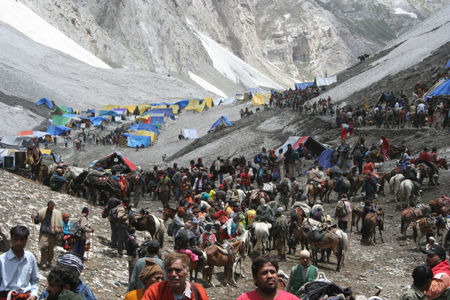As caravans of pilgrims on way to Amarnath cave shrine pass through the quaint villages of Pahalgam, the quiet and harmonious social environment gets severely disturbed for the village women left behind by their men folk most of whom busy themselves with the yatra. SHAMS IRFAN gets some snippets from Frislan.

Twenty one year old Ayesha Begum, who recently got married to one of her cousins looks curiously out of the window all day long hoping to see her husband’s familiar face.
Being new to the place, Ayesha finds it difficult to adapt to the lifestyle of Frislan, a villages along the Pahalgam-Chandanwari road, where her husband owns a small house overlooking the newly carpeted road.
“I feel like imprisoned in Frislan,” said Ayesha as she walks around her house to feed the cattle.
Her husband who owns two ponies rarely stays at home during two month long annual Amarnath pilgrimage. Ayesha told me that she was expecting her husband home that day as he had been out for a week now.
“I feel safe when he is around,” said Ayesha shyly.
Across the road, three women balancing bundles of thatch grass over their heads wait impatiently to cross the road, as a convoy of Yatra vehicles passes by.
Suddenly, the youngest of them shouted violently after a passenger bus passed her, “kachtember chuyeah (are you blind!),” and started clearing the dirty water her clothes were splashed with by the vehicle. In a flash, they all crossed the road and entered Ayesha’s courtyard. “This road has become a nuisance for us. They have made our lives hell,” said the young women angrily while trying to dry herself.
“We feel like aliens in our own village during these two months,” said the eldest of three women. “Look how that idiot spoiled her clothes deliberately,” she said while helping the young girl dry her dress.
The newly carpeted road cuts through the village and divides inhabited areas from the cornfields located downhill. “Every day we have to cross this road to reach our fields. But with so many vehicles playing on this road during Yatra it is hard to roam around freely,” said Safina, 37, who lives in a small wooden cottage near Ayesha’s house. “I avoid going to the fields when Yatris are passing by,” she added quickly.
Safina’s husband works as porter for pilgrims during the two month long Amarnath yatra. “I live all alone with my two kids in this house. He rarely comes home during Yatra,” said Safian.
“It is frustrating to work in the fields with so many strangers fixing their gaze on you,” she said after a shot pause. “But I cannot let our crops go waste either. It is matter of our livelihood.”
“My husband would close all the windows facing the road completely during the Yatra,” said Safina.
“It is like living in some over populated dirty city,” she Safian’s friend who refused to give her name. “Pahalgam is becoming another Dal Lake.”
Before her marriage to Fayaz Ahamd Lone, Ayesha lived in Renzpal, a small village located along the Lidder River. “Our village had good forest cover. No outsider could peep into our lives unlike in Frislan,” said Ayesha. “I don’t know how women of this village manage their lives. I feel chocked inside these walls.”
“I was never afraid to move around in my village. We never had any idea that this Yatra changes people’s lifestyle completely,” said Ayesha.
Most of the potters and horse owners who help pilgrims carry goods and material to different base camps along the mountain track live in Frislan.
As the women talked in Ayesha’s courtyard, a group of young boys alighted from a small passenger vehicle that has stopped nearby. After wandered aimlessly for sometime they found a secluded spot to relieve themselves. One after another they started answering nature’s calls in the open.
“Come inside quickly,” shouted Ayesha’s mother in law from inside the house.
Within no time Ayesha and other women ran towards their respective houses slamming the doors shut behind them with a bang.















